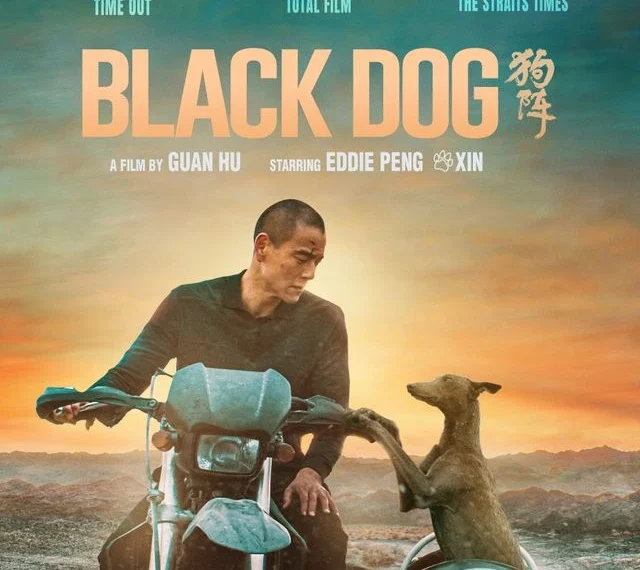Reviewed on May 18th 2024, at the 2024 Cannes Film Festival – Un Certain Regard. 116 mins
Cast: Eddie Pang, Tong Liya, Jia Zhangke, Zhang Yi, Zhou You, Yuan Hong, Vision Wei, Wang Yanhui, Hu Xiaoguang
Genre: Drama, Thriller
Director: Hu Guan
In Irish Cinemas: Now
Winner of the 2024 Cannes Film Festival’s Un Certain Regard award, Black Dog is a poignant exploration of social realism skillfully crafted with an understated yet powerful approach. The film is punctuated by moments of breathtaking beauty that elevate its quiet narrative. Directed by Hu Guan, who gained widespread recognition for his work on the 2020 box office sensation “The Sacrifice”, Black Dog showcases his versatility as a filmmaker. Here, Hu transitions from the grandeur of epic war dramas to the nuanced, intimate storytelling of smaller-scale human experiences, demonstrating his ability to captivate audiences with prominent and personal tales.
Black Dog begins with a slow, sweeping shot across the vast, haunting beauty of the Gobi Desert. The barren landscape stretches endlessly beneath a cavernous grey-blue sky, evoking a sense of isolation and grandeur. As the camera continues to pan, the stillness is abruptly broken by the sudden appearance of dogs—dozens, maybe hundreds, racing wildly across the desert sands. Their chaotic movement disrupts the tranquil scene, creating a striking contrast between the untamed natural world and the stark intrusion of humanity. The wild pack surges onto a nearby road, forcing a passing bus to swerve violently, ultimately causing it to topple onto its side. This unsettling collision between the untamed and the manufactured world is not just a shocking moment but a powerful visual metaphor that the film will revisit, highlighting the ongoing tension between human technology and the natural environment.

In June 2008, as the world prepared for the Beijing Olympics, former rockstar and stunt rider Lang (played by Taiwanese superstar Eddie Pang) was granted early release from prison on probation. Returning to his hometown, Lang is determined to turn over a new leaf and rebuild his life. As part of his rehabilitation, he is assigned the task of helping to clear the town of its overwhelming stray dog population. During this challenging assignment, Lang unexpectedly forms a bond with one of the stray dogs, leading to an unlikely and transformative friendship.

The story unfolds in what can only be described as a ghost town, where crumbling buildings stand as relics of a bygone era, caught in limbo between the past and the present. The few remaining residents, stubbornly clinging to their homes, are being pushed out to make way for the construction of new, Olympic-worthy infrastructure. The town’s sole attraction is a pitiful, nearly abandoned zoo, where the number of animals in cages pales compared to the stray dogs roaming the deserted streets. Is this a tale of two strays? When a bounty is announced for a rabid black greyhound terrorising the townsfolk, Lang takes matters into his own hands. In a desperate bid to lure the hound, he urinates on the street corner where the beast was last seen, only to receive vicious bites on his backside for his effort. Later, when he finally captures the notorious canine and his truck is overturned in a violent dust storm, we begin to grasp the true nature of Lang. He is the kind of man who, despite the danger, would rescue a feral, snarling creature from the storm and bring it back to safety, undeterred by the threat it still poses.

The dog, essentially a fugitive evading the authorities, begins the story chained in the yard. As the narrative progresses, it moves to a chair in the shabby entryway of Lang’s house, eventually sharing Lang’s bed and accompanying him during baths and mealtimes. Their growing bond is touching and poetic, especially since Pang adopted the dog, Xin, after filming wrapped. Lang’s violent past contrasts sharply with his present role as a reluctant member of a dog-catching team. Despite his past, he lacks the heart to be harsh with animals that only bite in self-defence, nor can he bear to confiscate cherished family pets from owners who refuse to pay for microchipping and registration. Even shooting a rabbit for food is beyond him. When Lang does resort to violence to protect the defenceless, he does so with intense enthusiasm. The film’s sole conventional action scene is a bold directorial choice, taking place off-screen behind closed doors, with only the sounds of the struggle indicating the fight’s progress. Lang’s nemesis is the local gangster Butcher Hu (Hu Xiaoguang), who runs a kebab restaurant and breeds snakes and a grudge against Lang for the death of his nephew.

Lang served time for the incident, though Hu sarcastically questions the verdict, dismissing it as a mere accident. Lang’s sponsor, Mr. Yao, is portrayed by acclaimed director Zhangke Jia, whose cameo appears deliberate. Jia’s films echo the themes, tone, and pacing in “Black Dog”. While “Ash is the Purest White” employs more conventional gangster tropes, “A Touch of Sin” explores themes similar to those of lost souls and trauma. Lang’s father (Wang Yanhui) plays a minor role, his presence limited to the remnants of his zoo and his gradual descent into alcoholism. Aside from Lang and arguably Hu, other characters remain archetypal and lack complete arcs. Many of the film’s dramatic twists are foreseeable, even if they unfold unexpectedly. Given its compelling story and striking visuals, “Black Dog” seems ripe for a Hollywood remake shortly. Yet, the original film now offers a visually arresting and emotionally rich experience. With a spellbinding central performance, an expressive animal companion, and meticulously crafted shots—particularly a breathtaking sequence toward the end featuring dozens of animals in a stately tableau—the film is a memorable and unique viewing experience.
Overall: 6.5/10


















